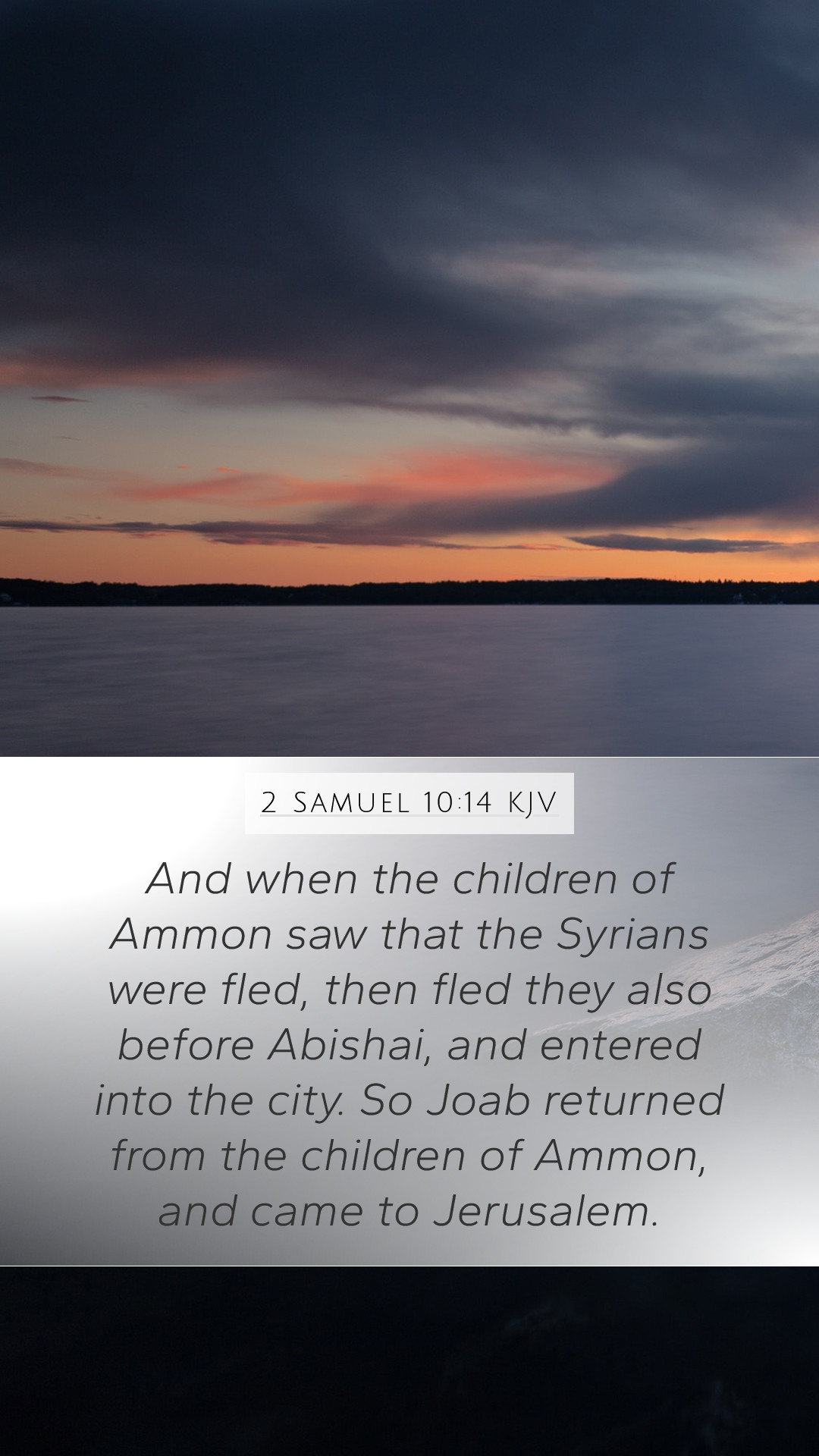Old Testament
Genesis Exodus Leviticus Numbers Deuteronomy Joshua Judges Ruth 1 Samuel 2 Samuel 1 Kings 2 Kings 1 Chronicles 2 Chronicles Ezra Nehemiah Esther Job Psalms Proverbs Ecclesiastes Song of Solomon Isaiah Jeremiah Lamentations Ezekiel Daniel Hosea Joel Amos Obadiah Jonah Micah Nahum Habakkuk Zephaniah Haggai Zechariah Malachi2 Samuel 10:14 Meaning
What is the meaning of 2 Samuel 10:14?
And when the children of Ammon saw that the Syrians were fled, then fled they also before Abishai, and entered into the city. So Joab returned from the children of Ammon, and came to Jerusalem.
2 Samuel 10:14 Bible Verse Meaning
Understanding 2 Samuel 10:14
The Bible verse 2 Samuel 10:14 presents an intriguing moment in the narrative of the Israelite kingdom, highlighting themes of warfare, strategy, and divine providence. This analysis aims to explore the meaning of this verse by synthesizing insights from public domain commentaries, providing a comprehensive Bible verse interpretation.
Bible Verse Context
2 Samuel 10:14 states: "And when the children of Ammon saw that the Syrians were fled, they also fled before Abishai, and entered into the city. So Joab returned from the children of Ammon, and came to Jerusalem." To understand this verse, it is crucial to consider the surrounding events in the life of David and the political landscape of the time.
Bible Verse Meanings
-
Conflict and Strategy:
In this instance, David had sent Abishai to confront the Ammonites who had allied with the Syrians. The verse indicates a moment of tactical retreat from the Syrians, showing that the outcome of battles can shift unexpectedly based on strategic maneuvers.
-
Divine Intervention:
Commentators like Matthew Henry emphasize the role of God's providence in warfare. The abandonment of the Syrians highlighted that their forces were not sufficient against God-fearing people. Thus, it reflects God's favor on David's leadership.
-
Fear as a Motive:
Albert Barnes notes that the fear instilled in the Ammonites due to the fleeing Syrians catalyzed their own retreat, indicating a psychological aspect of warfare that reflects broader themes of fear and anxiousness in battle.
Insights from Bible Commentaries
This verse has been the subject of various interpretations, each shedding light on different aspects:
-
Historical Context:
Adam Clarke discusses the historical backdrop of the Ammonite war, emphasizing how dynastic struggles influenced the conflicts of the time. Understanding the geopolitical tensions enriches our understanding of this scripture.
-
The Role of Leadership:
David's leadership is evident in his ability to send capable generals like Joab and Abishai. Their actions reflect qualities of bravery and tactical wisdom, which are influential in Biblical character studies.
-
Symbolism of Cities:
The retreat of the Ammonites into their fortified city signifies the reliance on worldly defenses rather than divine support, illustrating a recurring theme throughout Scripture about the limitations of human strength against divine power.
Application of the Verse
In applying 2 Samuel 10:14 to our lives, believers can draw out several lessons:
-
Trust in God During Conflicts:
Just as David and his men trusted in God's power to secure victory, Christians are called to rely on divine assistance in their own conflicts—both spiritual and personal.
-
The Importance of Good Leadership:
This verse serves as a reminder of the impact of wise and courageous leaders. Whether in a spiritual or a community context, good leadership can influence the outcomes critically.
-
Understanding Fear:
The psychological aspects of fear, as shown in the response of the Ammonites, reflect how fear can affect both faith and action in our lives. Learning to face fears through faith in God can lead to spiritual victories.
Related Bible Cross References
Here are several verses that relate to the themes addressed in 2 Samuel 10:14:
- 1 Samuel 17:45-47 - David's faith over Goliath.
- Psalm 20:7 - "Some trust in chariots and some in horses, but we trust in the name of the Lord our God."
- 2 Chronicles 20:15 - The battle is the Lord's.
Conclusion
In summary, the analysis of 2 Samuel 10:14 reveals profound insights into military strategy, divine providence, and the importance of leadership. Through this verse, we gain a deeper understanding of the historical context, psychological implications, and moral lessons that can be applied to modern-day situations. The combination of these interpretations offers readers a richer understanding of Scripture, which can be beneficial for personal Bible study or group discussions.


